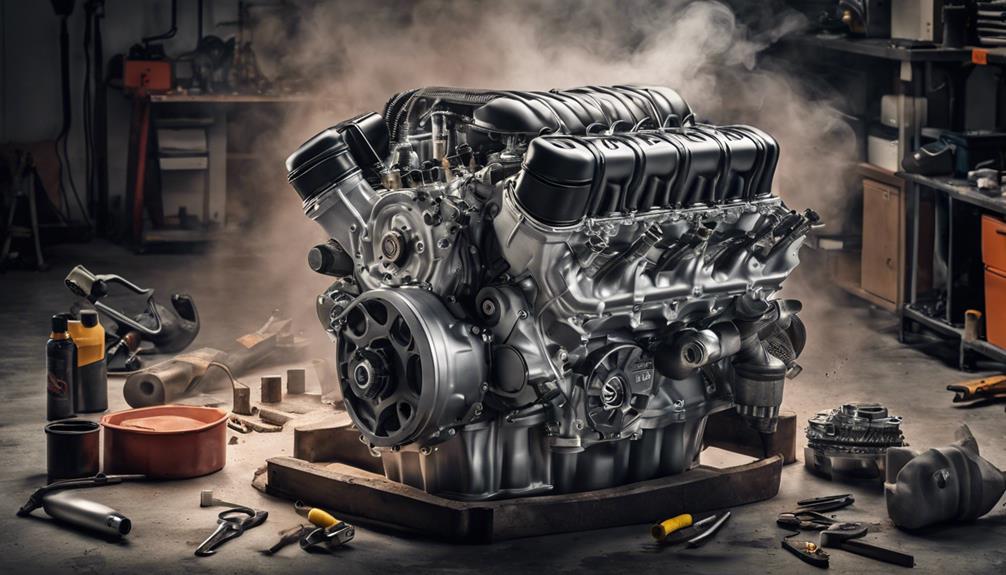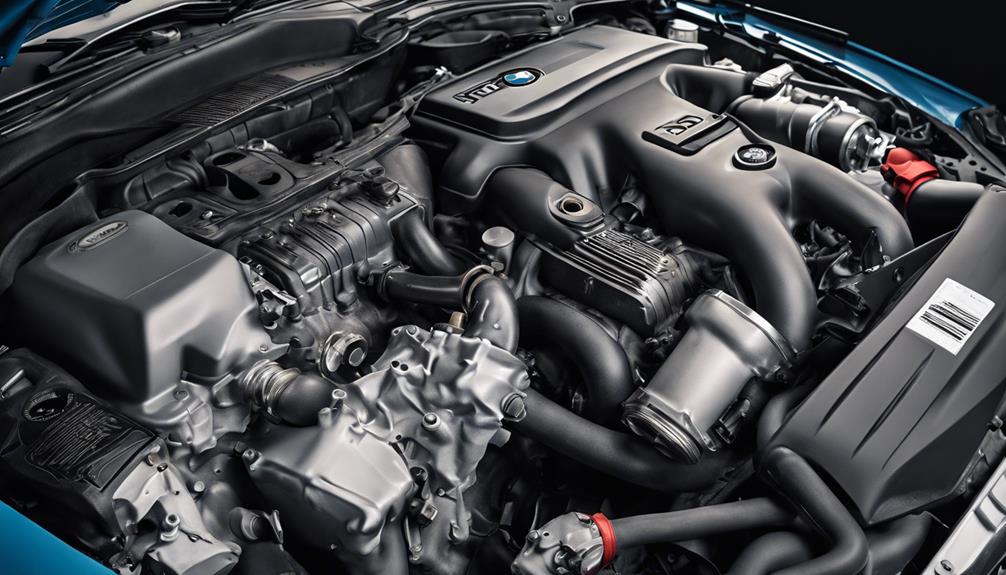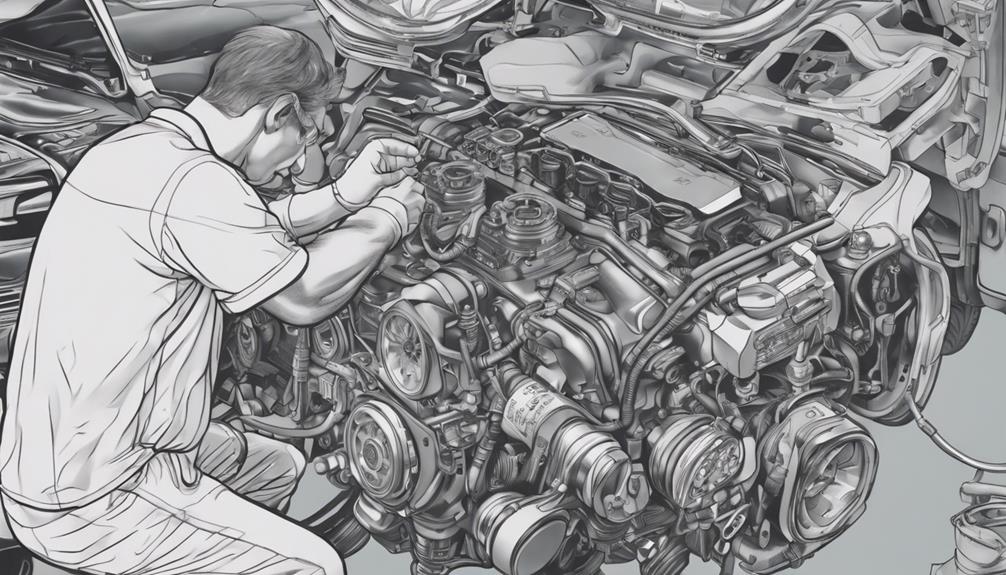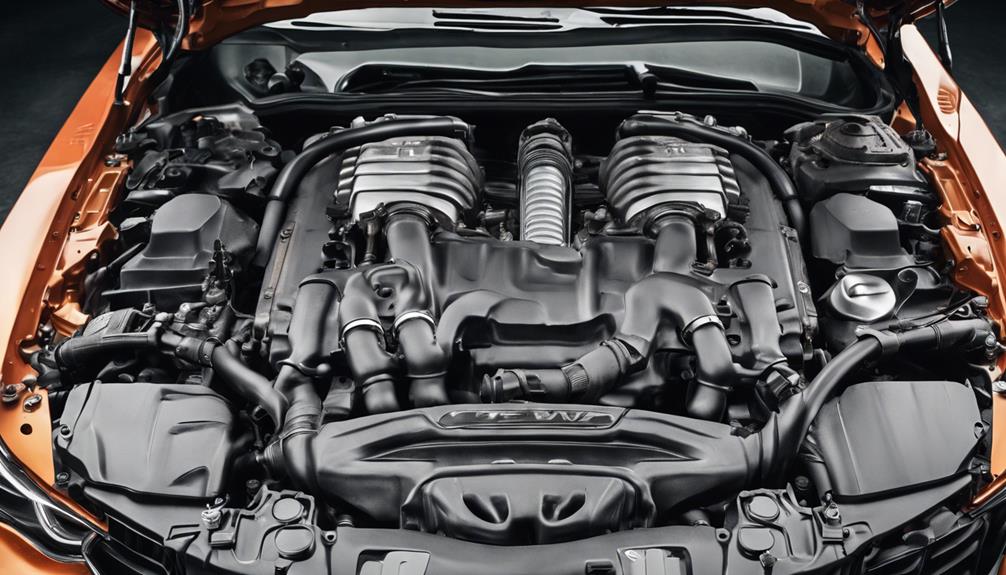If you're driving a BMW ActiveHybrid 3, be aware of potential engine failures around 110,000 miles and transmission issues like delayed responses. Battery concerns, such as lifespan and replacement costs, should not be overlooked, while prompt attention to electrical system malfunctions can prevent long-term damage. Issues with cooling systems, technology glitches, poor exterior and interior quality, and fuel system and brake concerns are also common. Exploring these common problems can help you stay ahead of potential costly repairs.
Key Takeaways
- Engine and transmission issues around 110,000 miles.
- Battery replacement every 8-10 years, costing $2,000-$6,000.
- Electrical system malfunctions due to hybrid components.
- Cooling system problems like overheating warnings.
- Technical troubles such as system freezing and Bluetooth connectivity issues.
Engine Failure

When driving a BMW ActiveHybrid 3, be prepared to face the common and potentially troublesome issue of engine failure. This problem ranks as the top reported issue with the 2013 model. Typically, drivers experience engine failure around 110,000 miles, highlighting the importance of monitoring your vehicle's performance as it reaches this milestone. Although specific cost data for fixing engine failure isn't readily available, users are actively contributing complaints to gather more data on this concerning matter.
To tackle engine failure in your BMW ActiveHybrid 3, staying informed and vigilant is key. By keeping an eye on user complaints and trends, you can identify potential solutions or preventive measures. Remember, being proactive in addressing engine issues can save you time, money, and a headache down the road. So, the next time you hit the road in your ActiveHybrid 3, drive with freedom and confidence, knowing you're equipped to deal with engine failure should it arise.
Transmission Issues
If you're noticing your BMW ActiveHybrid 3 experiencing gear shifting problems, delayed response times, or fluid leakage concerns, you might be facing transmission issues.
These symptoms could indicate underlying problems that may necessitate attention to prevent further damage down the road.
Addressing transmission issues promptly can safeguard you from costly repairs and guarantee a smoother driving experience.
Gear Shifting Problems
Gear shifting problems in the BMW ActiveHybrid 3 can disrupt your driving experience and potentially signal underlying transmission issues that require attention. Issues like delayed or rough shifting, jerking sensations, or slipping gears are common signs of transmission problems. If you notice warning lights on the dashboard, such as the transmission malfunction light, it's important to address these issues promptly.
Low transmission fluid levels, faulty solenoids, or problems with the transmission control module are often the culprits behind gear shifting issues. Ignoring these signs could lead to more extensive damage, resulting in pricey repairs. Stay ahead by scheduling regular maintenance checks and addressing any unusual gear shifting behavior promptly to prevent major transmission problems in your BMW ActiveHybrid 3.
Delayed Response Times
Experiencing delayed response times while driving your BMW ActiveHybrid 3 could indicate underlying transmission issues affecting your vehicle's performance. When it comes to transmission issues, here are some key points to keep in mind:
- Essential: If you notice your car jerking during gear shifts, it could be a sign of transmission problems.
- Take into account: Delayed or rough gear changes may point towards transmission issues that need attention.
- Inadequate Acceleration: Transmission problems can lead to sluggish acceleration, impacting your driving experience.
- Costly Repairs: Addressing transmission issues promptly is vital as repairs can be expensive and time-consuming.
Being aware of these signs and addressing transmission issues promptly can help maintain the performance of your BMW ActiveHybrid 3 and prevent further complications.
Fluid Leakage Concerns
Fluid leakage in your BMW ActiveHybrid 3 demands immediate attention to prevent transmission issues from escalating. Transmission fluid leakage can lead to low fluid levels, impacting gear shifts and overall performance. Ignoring this could result in costly repairs and drivability concerns.
Keep an eye out for any red stains under your vehicle, indicating a potential leak. Regularly inspecting your transmission system and promptly addressing any fluid leakage can prevent further damage. Remember, a small leak today could lead to significant transmission problems tomorrow.
Stay proactive and guarantee that your BMW ActiveHybrid 3 operates smoothly by taking care of transmission fluid leakage promptly.
Battery Problems
You might encounter issues with the battery lifespan in your BMW ActiveHybrid 3, which can lead to charging complications and power loss concerns.
Keeping an eye on the battery's health is essential to prevent any unexpected performance hiccups and expensive repairs down the road.
Battery Lifespan Issues
When it comes to the BMW ActiveHybrid 3, one of the key concerns that owners may encounter is the longevity of the hybrid battery.
Here are some insights to help you navigate the battery lifespan issues:
- Varied Lifespan: The BMW ActiveHybrid 3 battery typically lasts around 8-10 years, but this can fluctuate based on driving habits and climate.
- Costly Replacement: Replacing the hybrid battery can dent your wallet, ranging from $2,000 to $6,000.
- Premature Failures: Some owners have experienced premature hybrid battery failures, highlighting the importance of careful usage.
- Maintenance Matters: Regular charging and avoiding deep discharges are essential for extending the hybrid battery's lifespan.
Understanding these factors can assist you in maximizing the longevity of your BMW ActiveHybrid 3's battery.
Charging Complications
Experiencing charging complications in the BMW ActiveHybrid 3 due to battery problems can greatly impact the vehicle's overall performance and efficiency. Issues with the hybrid battery can lead to reduced functionality and may require specialized maintenance for proper charging.
When facing charging complications, the ActiveHybrid 3's hybrid system may struggle to operate at its best, affecting its overall efficiency. Promptly addressing these battery problems is essential to make sure that the hybrid battery charges correctly and the vehicle functions as intended.
Don't let charging issues slow you down; stay on top of maintenance and diagnostics to keep your ActiveHybrid 3 running smoothly and efficiently. Remember, a well-charged battery is key to maximizing the full potential of your BMW ActiveHybrid 3.
Power Loss Concerns
Facing power loss concerns in the BMW ActiveHybrid 3 often stems from underlying battery problems, impacting the vehicle's performance and drivability. Here are some insights to help you navigate through this issue:
- Start-Up Struggles: If your ActiveHybrid 3 is having difficulty starting, it could be a sign of battery trouble causing power loss.
- Mid-Drive Dilemmas: Experiencing sudden power loss while cruising? Faulty hybrid batteries might be the culprit.
- Dashboard Warnings: Keep an eye out for warning lights signaling battery issues. Ignoring them could worsen power loss concerns.
- Preventive Measures: Regular battery maintenance and checks are key to averting complete power loss and ensuring your ActiveHybrid 3 stays in top shape.
Electrical System Malfunctions
Amidst the sleek design and impressive performance of the BMW ActiveHybrid 3, the specter of electrical system malfunctions looms ominously, causing concerns for owners.
The complex hybrid components in the ActiveHybrid 3 can sometimes lead to issues within the electrical system. Failures in the hybrid battery, high-voltage components, control modules, sensors, or wiring may result in erratic behavior and trigger warning lights on the dashboard.
These malfunctions not only affect the performance of your vehicle but also hint at potential long-term damage if left unaddressed. To guarantee your ActiveHybrid 3 continues to run smoothly, it's crucial to promptly address any electrical system problems that arise.
Cooling System Troubles
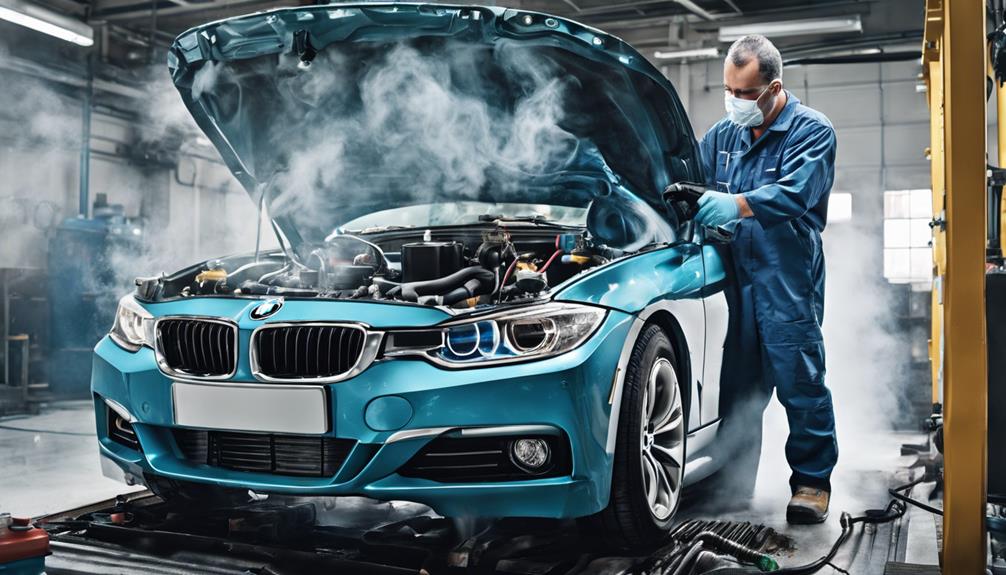
If your BMW ActiveHybrid 3 is giving you overheating warning signals, experiencing coolant leaks, or showing signs of thermostat malfunctions, it might be time to address some cooling system troubles.
These issues can lead to costly repairs ranging from $500 to $1500, so it's important to tackle them promptly.
Stay ahead of the game with regular maintenance to prevent any engine damage and keep your hybrid system running smoothly.
Overheating Warning Signals
When encountering overheating warning signals in your BMW ActiveHybrid 3, immediate attention to the cooling system troubles is crucial to prevent costly engine damage. Here are some key signs to watch for and steps to take:
- Temperature Gauge: If it starts creeping into the red zone, it's time to take action.
- Warning Lights: Dashboard lights flickering? It's a clear indication.
- Leaks or Steam: Keep an eye out for steam or coolant leaks under the hood.
- Preventive Measures: Regularly check coolant levels, inspect the radiator, and make sure the cooling fan is working correctly.
Ignoring these warning signals could lead to severe engine issues, so be proactive when it comes to your car's cooling system health.
Coolant Leaks Detection
Detecting coolant leaks in your BMW ActiveHybrid 3 is essential for preventing potential overheating and engine damage. Common signs of coolant leaks, such as low coolant levels, visible puddles under the car, and overheating, shouldn't be ignored. These leaks can stem from issues with the radiator, hoses, water pump, or head gasket.
Promptly addressing any coolant leaks is important to avoid costly engine repairs. Regular maintenance and inspections play a significant role in preventing coolant leaks in the cooling system of your BMW ActiveHybrid 3. Stay vigilant and address any signs of coolant leaks promptly to keep your vehicle running smoothly and prevent any serious damage.
Thermostat Malfunctions Troubleshooting
Thermostat malfunctions in the BMW ActiveHybrid 3 can disrupt the cooling system, leading to overheating or insufficient heating in the vehicle. When dealing with thermostat malfunctions, consider these tips for troubleshooting:
- Monitor Temperature Gauge: Keep an eye out for erratic temperature gauge readings, as they could indicate thermostat issues.
- Check Air Vents: If you're not getting warm air from the vents, a faulty thermostat might be the culprit.
- Engine Performance: Faulty thermostats can mess with the engine cooling system, affecting overall vehicle performance.
- Prompt Action: Addressing thermostat problems promptly is essential to prevent engine damage and maintain the car's proper temperature regulation.
Fuel System Concerns
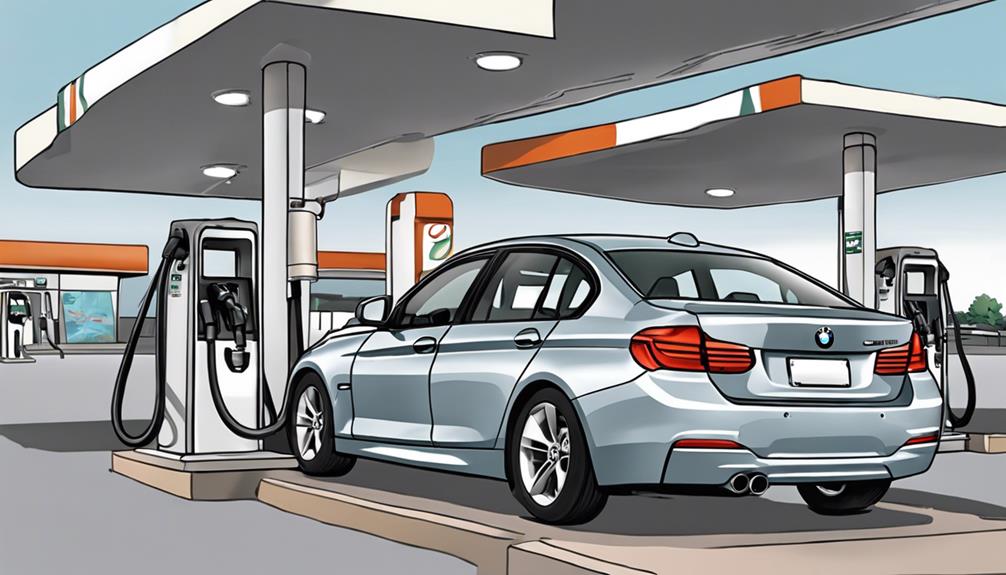
Amidst the smooth ride and luxurious features of the BMW ActiveHybrid 3, fuel system concerns can stealthily emerge, potentially causing performance issues and financial headaches for owners.
Fuel system issues like fuel leaks, fuel pump failures, or problems with fuel injectors may plague your ActiveHybrid 3, leading to symptoms such as rough idling, poor acceleration, decreased fuel efficiency, and engine misfires. Addressing these issues promptly is vital as repairs or replacements can be costly, especially if high-voltage components are involved.
To prevent major problems, regular fuel system inspections and maintenance are key to keeping your ActiveHybrid 3 running smoothly. Ignoring these concerns couldn't only impact the performance of your vehicle but also pose safety hazards.
Stay ahead of the game by staying vigilant about your fuel system health; it will save you from potential headaches down the road.
Brake System Failures
If your BMW ActiveHybrid 3 experiences brake system failures, it's essential to address them promptly to guarantee both safety and vehicle functionality. Here are some key points to take into account:
- Diagnosis is Key: When facing brake system failures, don't delay in getting a professional diagnosis to pinpoint the root cause of the issue.
- Costly Repairs: Be prepared for potential repair costs ranging from $800 to $1200 or more, depending on the severity of the brake system failure.
- Safety First: Brake system failures can lead to serious safety risks, including reduced braking power and potential loss of control while driving.
- Professional Assistance: Seek help from experienced mechanics who specialize in BMW ActiveHybrid 3 brake systems to ensure proper repair and maintenance.
Addressing brake system failures promptly is essential to keep you safe on the road and maintain the peak performance of your BMW ActiveHybrid 3.
Steering Problems

Experiencing stiff or difficult steering in your BMW ActiveHybrid 3 can indicate potential steering problems that require prompt attention to maintain driving safety and performance.
One of the reported issues in the ActiveHybrid 3 is power steering failure, which can lead to challenges in maneuvering your vehicle. When your steering feels unresponsive or heavier than usual, it could be a sign of underlying steering system failures. These problems not only affect your driving experience but also pose safety risks on the road.
To address steering issues, it's essential to have diagnostic testing done by a qualified technician. Timely intervention can prevent further damage and ensure your ActiveHybrid 3 remains safe to drive. Don't ignore the warning signs of steering problems; get them checked out promptly to keep your BMW running smoothly and securely.
Suspension Issues
When facing suspension issues in your BMW ActiveHybrid 3, addressing them promptly is crucial to guarantee top performance and driving comfort. Here are some key points to help you navigate through suspension problems:
- Identify Symptoms: Keep an eye out for signs like a rough ride, uneven tire wear, or difficulty controlling your vehicle. These could indicate underlying suspension issues that need attention.
- Professional Inspection: Don't hesitate to take your ActiveHybrid 3 to a qualified mechanic for a thorough inspection. They can pinpoint the exact problem and recommend the best course of action.
- Timely Repairs: Whether it's replacing worn-out shocks or opting for a complete suspension overhaul, prompt repairs can prevent further damage and ensure a smoother driving experience.
- Regular Maintenance: Stay proactive by scheduling routine maintenance checks. This can help catch suspension issues early on, saving you time and money in the long run while keeping your ActiveHybrid 3 in top shape for the road ahead.
Air Conditioning Faults
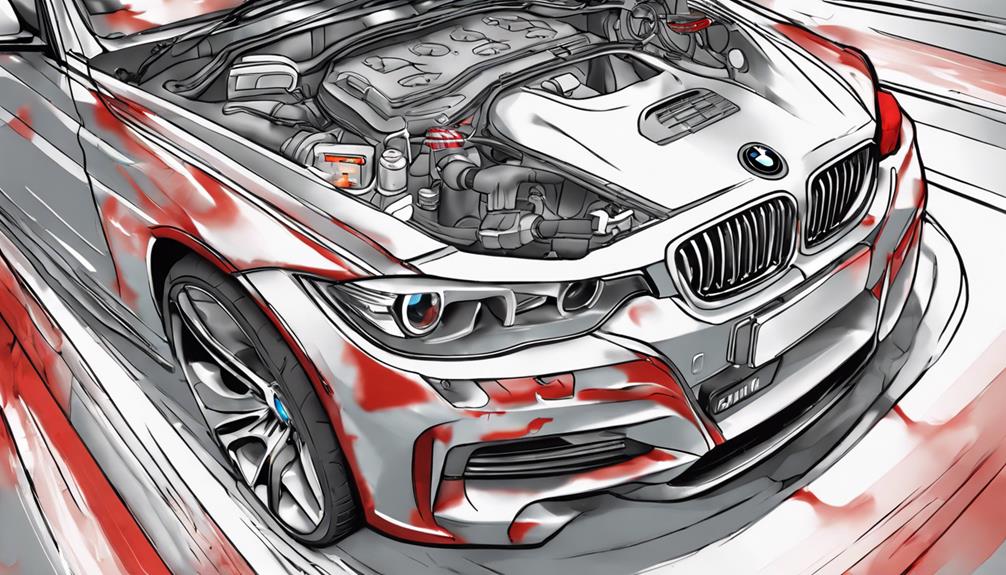
Air conditioning faults in the BMW ActiveHybrid 3 can stem from issues with the refrigerant lines, potentially leading to inefficient cooling performance. When your air conditioning isn't chilling as it should, it might be time to check those refrigerant lines. Here's a breakdown of potential costs for addressing air conditioning faults in your ActiveHybrid 3:
| Fault Description | Estimated Repair Cost |
|---|---|
| Refrigerant Line Replacement | $831 to $857 |
| Faulty ABS Control Module Replacement | $1,777 to $1,863 |
Ensuring your air conditioning system is in top shape is crucial for a pleasant drive in your ActiveHybrid 3. Don't let those faults linger; tackling them promptly can save you from further troubles down the road. So, keep cool, address those air conditioning issues, and enjoy the breeze of comfort in your BMW ActiveHybrid 3.
Technology and Infotainment Glitches
Exploring the technology and infotainment systems in your BMW ActiveHybrid 3 may sometimes feel like a digital adventure with unexpected glitches along the way. When it comes to technology glitches, here are a few hiccups you might encounter:
- Navigation Woes: The navigation system in the ActiveHybrid 3 has been known to freeze or crash unexpectedly, leaving you temporarily lost in the digital world.
- Bluetooth Blues: Users have grumbled about Bluetooth connectivity issues, with the connection cutting in and out intermittently, disrupting your groove on the road.
- iDrive Dilemmas: The iDrive system might throw a tantrum by displaying error messages or ignoring your commands, making you feel like you're in a battle of wills with your car.
- Audio Antics: Some owners have been serenaded by static or distortion from the audio system during playback, turning your driving soundtrack into a less-than-pleasant experience.
Exterior and Interior Quality Concerns

Addressing exterior and interior quality concerns with your BMW ActiveHybrid 3 may leave you questioning the brand's renowned craftsmanship. From reports of the exterior paint peeling and fading prematurely to interior trim pieces showing signs of wear and cracking, it seems like your vehicle might be going through a rough patch.
The dashboard materials feeling cheap and lacking the usual BMW standards might make you wonder if your car is playing a game of 'chew and spit' with its interior. And let's not forget about the sunroof leaks causing unwanted water damage inside the car; it's like your BMW is trying to turn into a mobile swimming pool.
As for the leather upholstery, durability issues such as premature wear and tearing might've you feeling like your car is a piece of gum being chewed up and spit out. With these quality concerns in mind, addressing them promptly is crucial to maintain the luxury experience you expect from your BMW ActiveHybrid 3.
Frequently Asked Questions
How Many Miles per Gallon Does the BMW 3 Series Active Hybrid Get?
You get an EPA-estimated 25 MPG in the city and 33 MPG on the highway with the BMW 3 Series Active Hybrid. It blends a 3.0L inline-6 engine with an electric motor for enhanced fuel efficiency, providing a total output of 335 horsepower and 332 lb-ft of torque.
Why Is the Check Engine Light on in My BMW Active Hybrid 3?
When your BMW ActiveHybrid 3's check engine light illuminates, it signals potential issues like a faulty oxygen sensor or loose gas cap. Addressing it promptly can prevent further damage and maintain your car's performance.
Why Is My BMW Hybrid Not Starting?
If your BMW hybrid isn't starting, a faulty high-voltage battery, issues with the hybrid system or electric motor, software glitches, or problems with the charging system may be the cause. Get a tech's help for a precise diagnosis.
How Does BMW Activehybrid 3 Work?
The BMW ActiveHybrid 3 pairs a 3.0-liter turbo inline-6 engine with an electric motor, adding 55 hp and 155 lb-ft of torque. Seamlessly switching between gas and electric power, it recharges via regenerative braking and offers short-distance electric-only mode for fuel efficiency.






